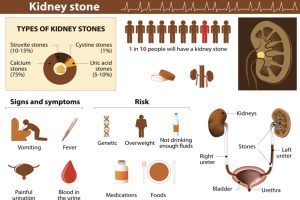
Researcher Dr. Jeremy Furyk explained, “Kidney stones are a bit of a mystery, occur frequently in the community, and generally affect young, healthy adults. It can be extremely painful to pass these jagged little crystallized minerals, and it’s very common for sufferers to go to an emergency department for treatment. Of more than 400 patients in the trial, we found those who received tamsulosin passed, their large kidney stones more often than the placebo group. This means patients with large stones might not need more complicated treatments including surgeries, and this has potential to improve care and reduce costs. We’re very excited because tamsulosin treatment may also allow patients to be treated closer to home rather than needing referral to a major centre.”
Dr. Furyk suggests that this mode of treatment can help individuals living in rural areas where treatment for kidney stones can be limited.
Kidney stone treatment and prevention
Some people require surgery to remove kidney stones, but many can address the pain without an invasive operation. Before we take a look at how to get rid of kidney stones naturally without surgery, let’s first discuss some preventative measures to avoid kidney stone formation.
As mentioned above, we all have the potential for developing kidney stones. However, there are some steps that can decrease your risk. Take a look at the prevention tips below to see how you can lessen your chances of getting kidney stones.
- Drink lots of fluids to keep your urine less concentrated with waste
- Eat more fruits and vegetables, which make urine less acidic
- Reduce excess salt as it can add to stone formation
- Get sufficient amounts of calcium
Now, chances are, anyone who does get this condition would want to know how to get rid of kidney stones without surgery. While every case is different, especially in light of the different size of the stones, there are several home options.
The following list addresses how to get rid of kidney stones naturally with home remedies:
- Apple cider vinegar: Sufferers have reported that long-term use of apple cider vinegar can help cure and prevent kidney stones. Mix the apple cider vinegar with honey and drink it several times during the day, or mix it with baking soda in a glass of water and drink it daily until the stones pass from the body.
- Uva ursi: This is a bearberry that grows naturally in the northern hemisphere. It is rich in tannins and flavonoids and seems to help soften kidney stones.
- Lemon juice and olive oil:Citric acid in lemons helps break down crystals in stones, while olive oil serves as a lubricant, making it easier to pass the stone.
- Dandelion root: It is a diuretic, which can help the stones pass. It can be consumed in tea or as a supplement.
- Nettle leaf:It has diuretic and antibacterial properties, which can help the stones pass. Nettle leaf can be used to make tea.
- Basil:Some studies have shown that basil can dislodge stones from the kidney and the urethra. Take a handful of basil leaves and steep them in boiling water to make a tea.
- Wheatgrass juice: Many kidney stone sufferers have found wheatgrass highly effective in treating the problem.
- Bran flakes:A study by the American Society of Nephrology suggests diets rich in whole grains reduce kidney stones, partially due to fiber content.
- Celery: A glass of raw celery juice can relieve kidney stone pain, thanks to its antispasmodic properties. It is also a diuretic, helping increase the amount or urine to help flush out the stones.
- Kidney beans:Since they are high in fiber, they can be helpful in treating kidney stones.
- Lemonade/limeade/cranberry juice:These are high in citric acid, which can prevent crystals from forming in the first place or from increasing the size of your existing kidney stones.
- Water:Not only does it help to pass the kidney stones, it also reduces the risk of stone formation altogether.
If you have seen people in your family suffer from kidney stones and you are concerned about getting stones yourself, keep in mind that exercise can be helpful. Research shows that moderate exercise reduces the risk of kidney stones by up to 31 percent. A low oxalate diet can also be helpful. The most common type of kidney stones is made up of calcium oxalate, so avoiding foods that are high in oxalate makes sense. Nuts, most berries, wheat, figs, grapes, tangerines, beans, beets, carrots, eggplant, kale, leeks, olives, peppers, potatoes, spinach, sweet potatoes, and zucchini are all considered high in oxalate. Now, if you like these foods, just remember to eat them along with foods that contain calcium. The oxalate and calcium will bind together before reaching the kidney, reducing your risk of developing stones.
You should also be avoiding crash diets since they can increase the amount of uric acid in the bloodstream, thus increasing the risk of kidney stones.
Research also indicates that vitamin A helps people with kidney stones. In general, this vitamin is good for the urinary tract. Studies show that a daily dose of 25 mg of vitamin B6 can lower the oxalate level in the blood, decreasing the risk of kidney stones.